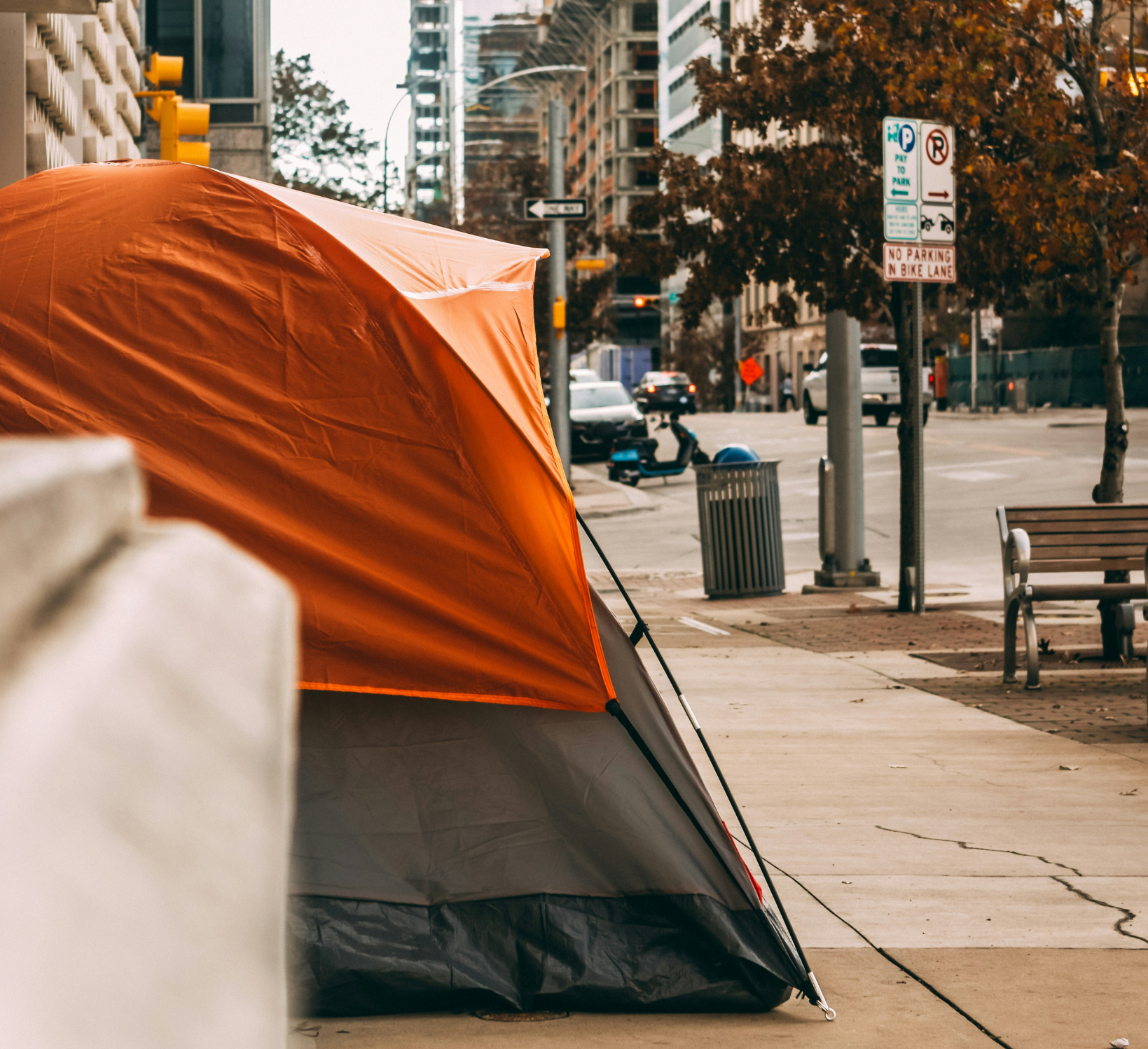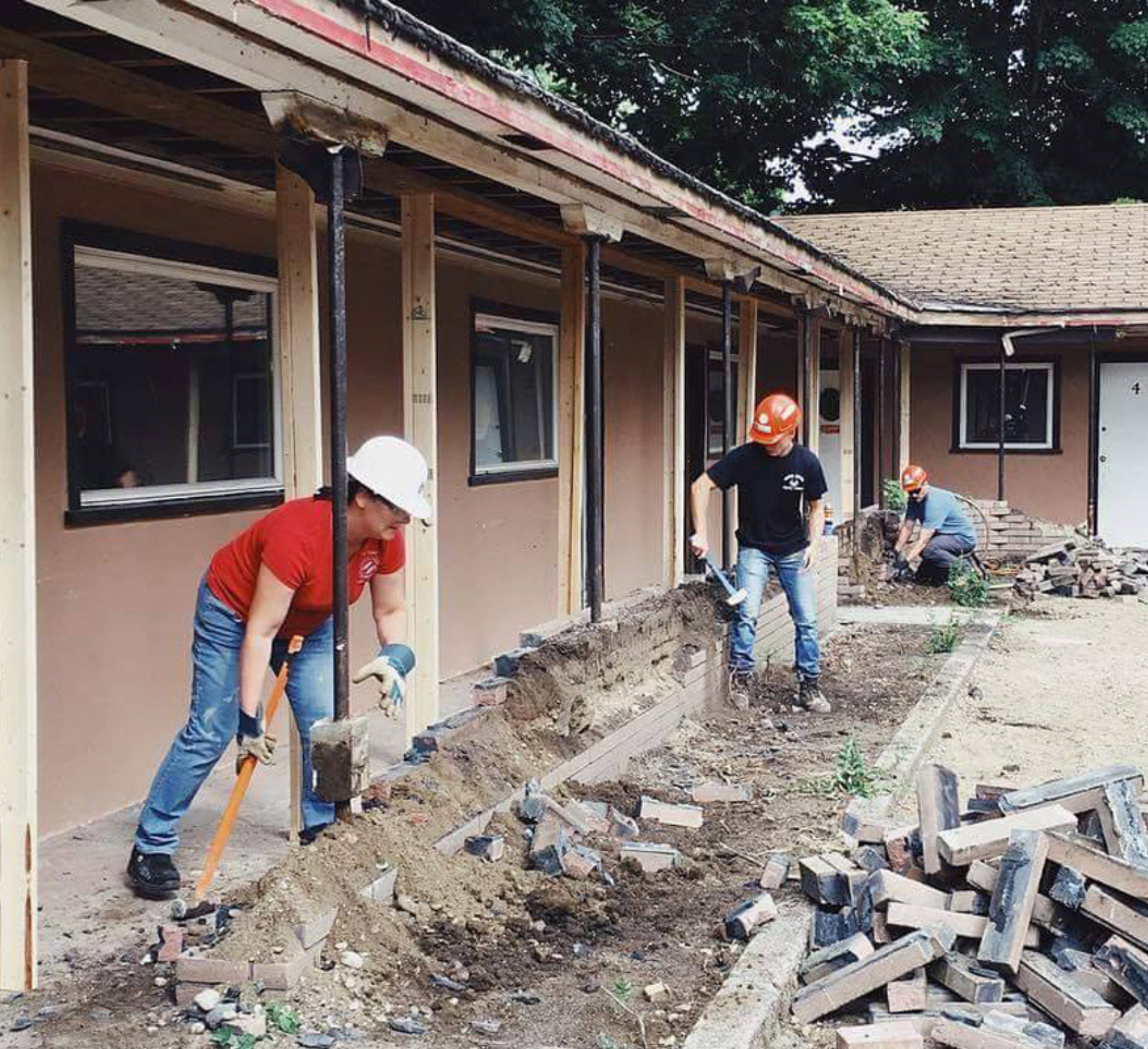
“Barrie is becoming known as a hotbed of bad policy choices right now,” says Jennifer van Gennip.
Jennifer is the director of communications and advocacy at Redwood Park Communities, a supportive housing provider in Barrie, Ontario. Earlier this year, Barrie city council proposed extending a bylaw which bars individuals and corporations from providing supplies and shelter to unhoused people on city property. In other words, it would be illegal for anyone, including charities, to give money, food, water, clothing, or other supplies unless on private property — the goal being to move homelessness out of sight.
The City ended up backing down after much resistance from community advocates like Jennifer, who says attitudes toward our neighbours experiencing homelessness need to change. “There’s a difference between feeling uncomfortable at the sight of fellow human suffering and being unsafe. Those are not the same thing.”
Regardless, without more affordable housing, Barrie residents will continue to face homelessness in their community. A June 2023 assessment showed housing stock has stalled, with only 350 net new rental units in the city in the last 20 years. Meanwhile, Barrie’s population is growing faster than the national average. And like the rest of the country, the steep price of buying a home in Barrie (the average price has gone up 89 percent in the last two years) is pushing many would-be homeowners into the rental market — pushing rent prices up, too.
“Shelters are at or above capacity and encampments have become commonplace,” Jennifer says. “The longer people experience homelessness, the more trauma they experience, and the more supports they need while they recover.”
Redwood Park Communities is taking action. They’re raising $56 million — with $10 million of that in community bonds — to fund their biggest affordable, supportive housing property to date: a 96-unit building for seniors in the community, with common spaces where residents can gather and connect with one another.

The building will become the fifth Redwood property, all with affordable units and the supports available that people might need to recover from homelessness or a personal housing crisis. Others include Lucy’s Place, a motel converted into a housing-first community for those experiencing chronic homelessness. Lucy’s Place provides 24 units for people who used to spend their winters outside, where they can reunite with families, build community with other residents — they’ve even held a wedding. United House, another Redwood property, helps those leaving the women and children’s shelter transition to more long-term housing.
Through all this work and more, Redwood prioritizes the agency and dignity of their residents, grounded by an understanding that homelessness isn’t a personal failure, but rather a failure of the systems that are meant to protect and support us.


Step 1: Learn
To raise $10 million toward their new project, Redwood will launch a community bond campaign in spring 2024. (New to community bonds? Learn about the model here.)
The first step in working with Tapestry Community Capital to raise funds is learning. All Tapestry clients participate in a workshop to learn the basics of community bonds, and meet with the Tapestry team to explore whether the fundraising model is right for their project. This is called the planning and feasibility stage.
For Redwood, it was a great fit for a few reasons. One is the flexible, self-directed nature of community bonds. Because the need is so great right now, and because the Barrie community has galvanized around housing as a human right, Redwood can seize the moment and start raising the money they need quickly — at least compared to getting a bank loan or applying for grants. “We want to build a lot of housing. To sit around and wait for government money, it takes forever. To try to do capital campaigns, they also take forever. We wanted to create a new way for people to invest in affordable housing in their own community, see their investment at work, and solve a social problem that they care about,” Jennifer says.


Community bonds are also an opportunity for advocacy. Throughout the bond raise, every potential investor will learn about Redwood’s vision for safe, supportive, affordable housing for all. The campaign will get press, with opportunities to reach local and even national decision-makers on housing policy. And ultimately, they’ll build an even stronger community around the right to housing.
This kind of education and advocacy has always been part of Redwood’s mission. In 2018 Redwood launched a YIMBY — short for “yes! in my backyard” — campaign. The goal is to counter those who say “not in my backyard” to new affordable and supportive housing. “We have big plans to build lots of housing, and we want to be welcomed to new neighbourhoods,” Jennifer says. “There is definitely a narrative out there around ‘those people’ living in your neighbourhood, and “the message of YIMBY is that everyone deserves a safe, affordable, hopeful place to call home and when that’s the case, our entire community benefits.”


Step 2: Prepare
After deciding community bonds were right for Redwood’s project, the next step was to work out the details. At this stage, Tapestry works with organizations to put together all the documents they need to start selling bonds successfully.
Redwood is offering four different bond series, or levels of investment, with the first level at a minimum $2,500 investment. “We really want all of our work to be very community-centric,” says Jennifer, “so it was important to us that there’d be an entry level for the average investor, not just really wealthy investors.” And investors will have the option to hold bonds over $10,000 in RRSPs and TFSAs.
Step 3: Raise
Redwood will begin selling community bonds in spring 2024. Until then, Jennifer and the rest of the Redwood team will continue to spark necessary conversations about housing and homelessness in Barrie, and to support people without access to safe, affordable housing.
And their excitement for their biggest project to date will continue to build. “We’re really excited to be coming to the Ferndale neighbourhood,” says Jennifer. “We’re excited to be offering this opportunity to people who want to invest in their own community, not just through donations but also through investments. Personally, as an investor, I’ve struggled to find things to invest in. I want to move beyond not just accidentally investing in American prisons or oil sands. I want to actually invest in good things and this is an opportunity to do that. I think I’m not alone in that.”

